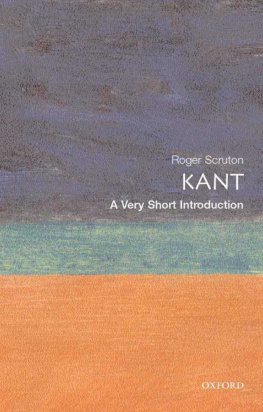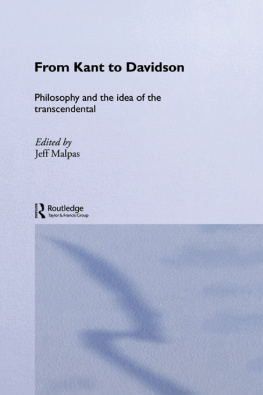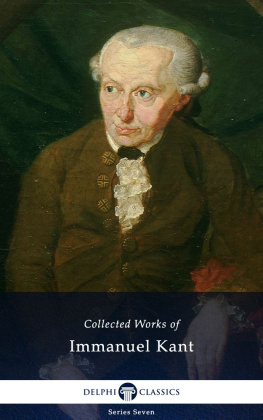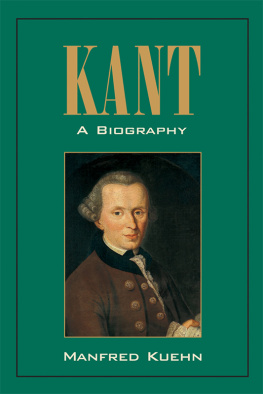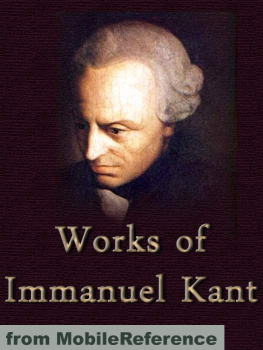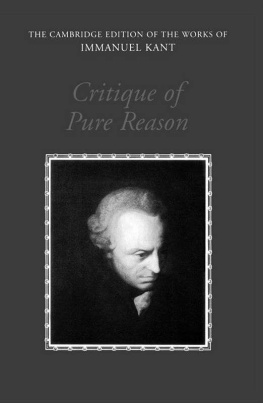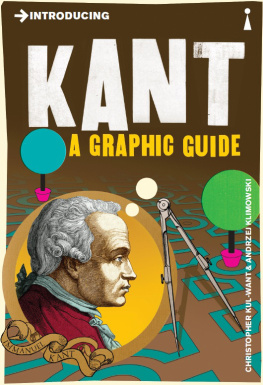Kant Immanuel - Critique of Practical Reason
Here you can read online Kant Immanuel - Critique of Practical Reason full text of the book (entire story) in english for free. Download pdf and epub, get meaning, cover and reviews about this ebook. genre: Science. Description of the work, (preface) as well as reviews are available. Best literature library LitArk.com created for fans of good reading and offers a wide selection of genres:
Romance novel
Science fiction
Adventure
Detective
Science
History
Home and family
Prose
Art
Politics
Computer
Non-fiction
Religion
Business
Children
Humor
Choose a favorite category and find really read worthwhile books. Enjoy immersion in the world of imagination, feel the emotions of the characters or learn something new for yourself, make an fascinating discovery.
- Book:Critique of Practical Reason
- Author:
- Genre:
- Rating:3 / 5
- Favourites:Add to favourites
- Your mark:
- 60
- 1
- 2
- 3
- 4
- 5
Critique of Practical Reason: summary, description and annotation
We offer to read an annotation, description, summary or preface (depends on what the author of the book "Critique of Practical Reason" wrote himself). If you haven't found the necessary information about the book — write in the comments, we will try to find it.
Critique of Practical Reason — read online for free the complete book (whole text) full work
Below is the text of the book, divided by pages. System saving the place of the last page read, allows you to conveniently read the book "Critique of Practical Reason" online for free, without having to search again every time where you left off. Put a bookmark, and you can go to the page where you finished reading at any time.
Font size:
Interval:
Bookmark:
The Project Gutenberg EBook of The Critique of Practical Reason, by Immanuel Kant(#3 in our series by Immanuel Kant)
Copyright laws are changing all over the world. Be sure to check thecopyright laws for your country before downloading or redistributingthis or any other Project Gutenberg eBook.
This header should be the first thing seen when viewing this ProjectGutenberg file. Please do not remove it. Do not change or edit theheader without written permission.
Please read the "legal small print," and other information about theeBook and Project Gutenberg at the bottom of this file. Included isimportant information about your specific rights and restrictions inhow the file may be used. You can also find out about how to make adonation to Project Gutenberg, and how to get involved.
**Welcome To The World of Free Plain Vanilla Electronic Texts**
**eBooks Readable By Both Humans and By Computers, Since 1971**
*****These eBooks Were Prepared By Thousands of Volunteers!*****
Title: The Critique of Practical Reason
Author: Immanuel Kant
Release Date: May, 2004 [EBook #5683][Yes, we are more than one year ahead of schedule][This file was first posted on August 7, 2002]
Edition: 10
Language: English
*** START OF THE PROJECT GUTENBERG EBOOK, THE CRITIQUE OF PRACTICAL REASON ***
This eBook was prepared by Matthew Stapleton.
1788
by Immanuel Kant
translated by Thomas Kingsmill Abbott
This work is called the Critique of Practical Reason, not of thepure practical reason, although its parallelism with the speculativecritique would seem to require the latter term. The reason of thisappears sufficiently from the treatise itself. Its business is to showthat there is pure practical reason, and for this purpose itcriticizes the entire practical faculty of reason. If it succeeds inthis, it has no need to criticize the pure faculty itself in orderto see whether reason in making such a claim does not presumptuouslyoverstep itself (as is the case with the speculative reason). Forif, as pure reason, it is actually practical, it proves its ownreality and that of its concepts by fact, and all disputationagainst the possibility of its being real is futile.
With this faculty, transcendental freedom is also established;freedom, namely, in that absolute sense in which speculative reasonrequired it in its use of the concept of causality in order toescape the antinomy into which it inevitably falls, when in thechain of cause and effect it tries to think the unconditioned.Speculative reason could only exhibit this concept (of freedom)problematically as not impossible to thought, without assuring itany objective reality, and merely lest the supposed impossibility ofwhat it must at least allow to be thinkable should endanger its verybeing and plunge it into an abyss of scepticism.
Inasmuch as the reality of the concept of freedom is proved by anapodeictic law of practical reason, it is the keystone of the wholesystem of pure reason, even the speculative, and all other concepts(those of God and immortality) which, as being mere ideas, remain init unsupported, now attach themselves to this concept, and by itobtain consistence and objective reality; that is to say, theirpossibility is proved by the fact that freedom actually exists, forthis idea is revealed by the moral law.
Freedom, however, is the only one of all the ideas of thespeculative reason of which we know the possibility a priori (without,however, understanding it), because it is the condition of the morallaw which we know. * The ideas of God and immortality, however, arenot conditions of the moral law, but only conditions of the necessaryobject of a will determined by this law; that is to say, conditions ofthe practical use of our pure reason. Hence, with respect to theseideas, we cannot affirm that we know and understand, I will not saythe actuality, but even the possibility of them. However they arethe conditions of the application of the morally determined will toits object, which is given to it a priori, viz., the summum bonum.Consequently in this practical point of view their possibility must beassumed, although we cannot theoretically know and understand it. Tojustify this assumption it is sufficient, in a practical point ofview, that they contain no intrinsic impossibility (contradiction).Here we have what, as far as speculative reason is concerned, is amerely subjective principle of assent, which, however, isobjectively valid for a reason equally pure but practical, and thisprinciple, by means of the concept of freedom, assures objectivereality and authority to the ideas of God and immortality. Nay,there is a subjective necessity (a need of pure reason) to assumethem. Nevertheless the theoretical knowledge of reason is not herebyenlarged, but only the possibility is given, which heretofore wasmerely a problem and now becomes assertion, and thus the practical useof reason is connected with the elements of theoretical reason. Andthis need is not a merely hypothetical one for the arbitrarypurposes of speculation, that we must assume something if we wish inspeculation to carry reason to its utmost limits, but it is a needwhich has the force of law to assume something without which thatcannot be which we must inevitably set before us as the aim of ouraction.
{PREFACE ^paragraph 5}
* Lest any one should imagine that he finds an inconsistency herewhen I call freedom the condition of the moral law, and hereaftermaintain in the treatise itself that the moral law is the conditionunder which we can first become conscious of freedom, I will merelyremark that freedom is the ratio essendi of the moral law, while themoral law is the ratio cognoscendi of freedom. For Pad not the morallaw been previously distinctly thought in our reason, we shouldnever consider ourselves justified in assuming such a thing asfreedom, although it be not contradictory. But were there no freedomit would be impossible to trace the moral law in ourselves at all.
It would certainly be more satisfactory to our speculative reason ifit could solve these problems for itself without this circuit andpreserve the solution for practical use as a thing to be referredto, but in fact our faculty of speculation is not so well provided.Those who boast of such high knowledge ought not to keep it back,but to exhibit it publicly that it may be tested and appreciated. Theywant to prove: very good, let them prove; and the criticalphilosophy lays its arms at their feet as the victors. Quid statis?Nolint. Atqui licet esse beatis. As they then do not in fact choose todo so, probably because they cannot, we must take up these armsagain in order to seek in the mortal use of reason, and to base onthis, the notions of God, freedom, and immortality, the possibility ofwhich speculation cannot adequately prove.
Here first is explained the enigma of the critical philosophy, viz.:how we deny objective reality to the supersensible use of thecategories in speculation and yet admit this reality with respect tothe objects of pure practical reason. This must at first seeminconsistent as long as this practical use is only nominally known.But when, by a thorough analysis of it, one becomes aware that thereality spoken of does not imply any theoretical determination ofthe categories and extension of our knowledge to the supersensible;but that what is meant is that in this respect an object belongs tothem, because either they are contained in the necessary determinationof the will a priori, or are inseparably connected with its object;then this inconsistency disappears, because the use we make of theseconcepts is different from what speculative reason requires. On theother hand, there now appears an unexpected and very satisfactoryproof of the consistency of the speculative critical philosophy. Forwhereas it insisted that the objects of experience as such,including our own subject, have only the value of phenomena, whileat the same time things in themselves must be supposed as their basis,so that not everything supersensible was to be regarded as a fictionand its concept as empty; so now practical reason itself, withoutany concert with the speculative, assures reality to a supersensibleobject of the category of causality, viz., freedom, although (asbecomes a practical concept) only for practical use; and thisestablishes on the evidence of a fact that which in the former casecould only be conceived. By this the strange but certain doctrine ofthe speculative critical philosophy, that the thinking subject is toitself in internal intuition only a phenomenon, obtains in thecritical examination of the practical reason its full confirmation,and that so thoroughly that we should be compelled to adopt thisdoctrine, even if the former had never proved it at all. *
Next pageFont size:
Interval:
Bookmark:
Similar books «Critique of Practical Reason»
Look at similar books to Critique of Practical Reason. We have selected literature similar in name and meaning in the hope of providing readers with more options to find new, interesting, not yet read works.
Discussion, reviews of the book Critique of Practical Reason and just readers' own opinions. Leave your comments, write what you think about the work, its meaning or the main characters. Specify what exactly you liked and what you didn't like, and why you think so.


